- Home
- Fyodor Dostoyevsky
Crime and Punishment Page 8
Crime and Punishment Read online
Page 8
One could hardly sink any lower or live more squalidly; but in his current mood Raskolnikov barely minded - just the opposite. He had withdrawn from people completely, like a tortoise into its shell, and even the face of the maid, who was obliged to attend to him and sometimes looked in, was enough to make him turn yellow and shake. So it goes with certain monomaniacs30 who focus too much on one thing. His landlady had ceased sending up food to him two weeks before, but it still hadn't occurred to him to go down and have it out with her, even though he went hungry. The tenant's mood rather suited Nastasya - the cook and the landlady's sole maid - and she'd stopped cleaning for him altogether, except for the occasional half-hearted sweep every week or so. It was she who woke him up now.
'Hey, lazybones!' she yelled right over his head. 'It's gone nine! I've brought you tea. Fancy a cup? You must be skin and bones!'
The tenant opened his eyes, gave a start and recognized Nastasya.
'Who's the tea from - the landlady?' he asked, slowly lifting himself up with a pained expression.
'As if!'
She set before him her own cracked pot, with tea made from old leaves, and dropped in two yellow lumps of sugar.
'Here, Nastasya, take this please,' he said, fumbling in his pocket for a handful of copper coins (he'd slept in his clothes), 'and go and buy me a roll. Get me a bit of sausage, too, while you're at it, the cheaper kind.'
'I'll bring you the roll right now, but how about some cabbage soup instead of sausage? Decent soup, made it yesterday. I put some aside, but you got in late. Decent soup it is.'
When the soup arrived and he set about eating, Nastasya sat down next to him on the couch and began nattering. She was a village girl and liked a good natter.
'Praskovya Pavlovna wants to complain to the p'lice about you,' she said.
He furrowed his brow.
'The police? What does she want?'
'You never pay and you never leave your digs. Clear enough what she wants.'
'That's all I need,' he muttered, gritting his teeth. 'Talk about bad timing . . . She's a fool,' he added loudly. 'I'll drop by today and have a word with her.'
''Course she's a fool, just like me, and I s'pose you're the brainy one, lying there like a sack of spuds and never showing your face? You says you used to teach children - so why ain't you doing nothing now?'
'I am doing things . . . ,' replied Raskolnikov, reluctantly and sternly.
'Like what?'
'Work . . .'
'What work?'
'Thinking,' he said seriously, after a pause.
Nastasya went into fits of laughter. She was the laughing sort, and when someone amused her she laughed inaudibly, her whole body swaying and shaking until she even began to feel sick.
'S'pose it pays handsome, then, thinking?' she finally managed to say.
'You can't teach children if you don't have shoes. Anyway, I've spat on the whole idea.'
'Mind you don't spit in the well.'
'Teaching kids pays copecks. What good are copecks?' he continued unwillingly, as though answering his own thoughts.
'S'pose you want your fortune right now, then?'
He threw her a strange look.
'I suppose I do,' he replied firmly, after a pause.
'Easy does it or you'll give me the creeps. What about that roll, then?'
'Up to you.'
'I nearly forgot! A letter came when you was out yesterday.'
'A letter! For me? Who from?'
'Don't ask me. I had to give the postman three copecks. Will I get 'em back?'
'Just bring it. For God's sake, bring it!' Raskolnikov shouted in great agitation.
The letter appeared a minute later. Just as he thought: from Mother, in R---- province.31 Taking it, he even turned pale. It was a long time since he'd last received a letter; but now there was also something else suddenly squeezing his heart.
'Leave, Nastasya, for the love of God; take your three copecks and please, just go!'
The letter shook in his hands; he didn't want to open it in her presence: he felt like being alone with this letter. When Nastasya went out, he brought it quickly to his lips and kissed it; then he stared for a good long while at the address, at the small, sloping handwriting, so familiar and so dear, of his mother, who'd once taught him how to read and write. He delayed; he almost seemed scared. At last, he opened it: the letter was large and thick, double the standard weight; two large sheets were covered in a minuscule script.
'My dearest Rodya,' wrote his mother, 'two months and more have already passed since I last conversed with you in writing, on account of which I have suffered and even lain awake at night, thinking. But I trust you will not blame me for this involuntary silence of mine. You know how much I love you; you are all Dunya and I have, you are everything to us, our hope, our comfort. How awful it was for me to hear that several months had already passed since you left university, being unable to support yourself,32 and that your lessons and other means of income had ceased! How was I to help with my pension of a hundred and twenty roubles a year? The fifteen roubles I sent you four months ago were borrowed, as you know yourself, on the strength of this same pension, from our local merchant Afanasy Ivanovich Vakhrushin. He's a kind man and he was also a friend to your father. But having granted him the right to take the pension in my stead, I had to wait for the debt to be paid off, and only now has that come to pass, so I had nothing to send you all this time. But now, thank God, it seems I can send you some more, and, in fact, we even have cause to boast of our good fortune, as I hasten to inform you. First of all, dearest Rodya, your sister - fancy this! - has been living with me for a month and a half already, and never again shall we be parted. Her torments, God be praised, are behind her, but I'll begin from the beginning, so that you may know how it all was and what we have kept from you until now. When you wrote to me, two months ago, that someone had told you that Dunya was suffering all manner of rudeness in the home of the Svidrigailovs and asked me for a precise explanation - well, what could I have replied? Had I written the whole truth, you might very well have dropped everything and come to see us, on foot if you had to, for I know both your character and your feelings, and I know that you would never allow your sister to be insulted. I was in despair myself, but what could I do? I didn't know the whole truth myself at the time. The main difficulty was that Dunechka, on joining their household last year as governess, accepted an advance of a full one hundred roubles on condition of a monthly deduction from her salary, and so there was really no question of her leaving the post without having first repaid the debt. She took this sum (I can tell you everything now, my priceless Rodya) chiefly in order to send you sixty roubles, which you were in such need of at the time and which you did indeed receive from us last year. We deceived you when we wrote that it came out of Dunechka's savings; that was not the case, and now I am telling you the whole truth, because now, by the will of God, everything has taken a sudden turn for the best, and because you should know how Dunya loves you and what a priceless heart she has. Mr Svidrigailov did indeed behave very rudely towards her at first, making all sorts of unseemly and mocking remarks to her at table . . . But I am loath to dwell on all these painful details, for fear of upsetting you needlessly, when all this is now behind us. In short, although Marfa Petrovna, Mr Svidrigailov's wife, treated her kindly and honourably, as did all the household, life was very hard for Dunya, especially when Mr Svidrigailov, lapsing into his old army ways, succumbed to the influence of Bacchus. But can you imagine: it later transpired that this madcap had long been nurturing a passion for Dunya, but had concealed it under the guise of rudeness and contempt towards her. Perhaps he was even ashamed and horrified to find himself - already advanced in years, the head of a family - entertaining such frivolous hopes, so he ended up venting his anger on Dunya. Or perhaps his vulgar manner and mockery were merely intended to hide the full truth from others. But in the end he could resist no longer and he dared to approach Dunya with an e
xplicit and beastly proposition, promising her various rewards and, what was more, to drop everything and take her away with him to a different village or even a different country. Just imagine how she suffered! Quitting her position there and then was out of the question, not only because of her financial debt, but also out of consideration for Marfa Petrovna, whose suspicions might suddenly have been aroused, which would inevitably have sown discord in the family. Dunya, too, would have found herself mired in scandal; it wouldn't have just blown over. There were plenty of other reasons, too, and Dunya could entertain few hopes of escaping from that awful house for at least six weeks. You know Dunechka. You know how intelligent she is, how tough she is. She can put up with a lot and, even in the most desperate situations, find within herself enough nobility of mind to maintain her resolve. She did not even write to me about it so as not to upset me, though we often exchanged news. The denouement arrived quite unexpectedly. Chancing to overhear her husband pleading with Dunechka in the garden, Marfa Petrovna misunderstood everything and pinned the blame on Dunya, assuming that she was the cause of it all. A terrible scene unfolded right there in the garden: Marfa Petrovna even struck Dunya a blow, wouldn't listen to a word that was said to her, wouldn't stop yelling herself, and eventually gave orders for Dunya to be driven off to me in town, forthwith, on a simple peasant cart onto which all her things were thrown - her linen, her dresses, untied and unpacked. Then the heavens opened and Dunya, insulted and disgraced, had to travel eleven long miles with a peasant in an uncovered cart. Just think: what could I have written to you in reply to the letter I received from you two months ago, and what could I have written about? I was in despair myself; I did not dare tell you the truth, for you would have been terribly unhappy, upset and indignant, and anyway, what could you have done? Merely make things worse for yourself, I imagine, and anyway, Dunechka forbade it; and filling a letter with trivialities, with such grief in my heart, was more than I could bear. The whole town was gossiping about this incident for an entire month, and it reached the point where Dunya and I could not even attend church on account of all the contemptuous glances and whispers, and some even spoke openly about it in our presence. All our acquaintances kept a wide berth and ceased even bowing to us in the street, and I learned for a fact that some salesmen and clerks had a mind to insult us by smearing the gates of our house with tar,33 so the landlords started demanding that we vacate the apartment. The cause of it all was Marfa Petrovna, who managed to blame Dunya and sully her name in every household. She knows everyone here and visited the town incessantly that month, and being rather fond of talking - especially about her domestic affairs and in particular her husband, about whom she complains to all and sundry, which is quite wrong - she succeeded, in a short space of time, in spreading this story not just through the town, but across the whole district as well. I fell ill, but Dunechka was stronger and you should have seen how she bore it all; she even managed to console and reassure me! Such an angel! But by God's mercy our torments were curtailed: Mr Svidrigailov had second thoughts, repented and, presumably taking pity on Dunya, provided Marfa Petrovna with full and certain proof of Dunechka's complete innocence: namely, the letter which Dunya, even before Marfa Petrovna had found them together in the garden, had been obliged to write and give to him so as to avoid the trysts and tete-a-tetes he insisted on, and which, following Dunechka's departure, remained in Mr Svidrigailov's hands. In this letter, showing great fervour and the deepest indignation, she reproached him precisely for his ignoble conduct towards Marfa Petrovna, reminding him that he was a father and head of a family; and finally, how beastly it was of him to torture and render unhappy a girl who was miserable and defenceless enough already. In a word, dearest Rodya, this letter is so noble and so touchingly written that I sobbed when I first read it and still cannot read it without tears. In addition, Dunya was vindicated by the belated testimony of the servants, who saw and knew far more than Mr Svidrigailov assumed, as is always the way. Marfa Petrovna was utterly shocked and "destroyed all over again", as she told us herself, but she no longer had the slightest doubt as to Dunechka's innocence, and the very next day, a Sunday, she came straight to the cathedral, fell to her knees and prayed tearfully to the Almighty to grant her strength to endure this fresh trial and fulfil her duty. Then, without paying a single visit along the way, she came directly to us, told us everything, wept bitterly and, utterly contrite, embraced Dunya and begged her forgiveness. The very same morning, without a moment's hesitation, she set off from ours to visit every house in town, shedding tears and speaking of Dunechka in the most flattering terms, so as to clear Dunya's name and reaffirm the nobility of her feelings and conduct. As if that wasn't enough, she showed everybody Dunechka's handwritten letter to Mr Svidrigailov, read it aloud and even permitted the making of copies (which I find a little excessive). She ended up having to spend several days in town, going from door to door, since some had begun taking offence at being overlooked, so a rota had to be established, with the result that she found people already waiting for her in every home, since everybody knew that on such-and-such a day in such-and-such a house Marfa Petrovna would be reading this letter, and at every reading there gathered even those who had heard the letter several times before, whether in their own homes or in the homes of other acquaintances, according to the rota. My own opinion is that much, if not most of this was quite unnecessary; but such is Marfa Petrovna's character. At any rate, she fully restored Dunechka's good name and this beastly business left its ineradicable stain on her husband alone, as the main culprit, to the extent that now I even feel sorry for him; this madcap didn't need to be treated quite so harshly. Dunya immediately began receiving invitations to give private lessons, but she turned them down. In general, everyone suddenly started treating her with marked respect. All this helped bring about that unexpected development through which our whole destiny, one might say, is now changing. You should know, dearest Rodya, that Dunya has a suitor and has already given her assent, as I now hasten to inform you. And although the matter was arranged without your opinion being sought, you will not, I expect, be displeased either with me or your sister; you will see for yourself, from the very facts of the matter, that it would have been impossible for us to wait and put it off until we had received your reply. In any case, you would not have been able to judge all this properly from far away. This is what happened. He, already a court counsellor, Pyotr Petrovich Luzhin by name, is a distant relative of Marfa Petrovna, who did much to bring this about. He began by indicating through her that he desired to make our acquaintance, was received in the appropriate manner, drank a cup of coffee, and sent a letter the very next day in which he set out his proposal with the greatest civility and requested a speedy and decisive reply. He is a business-like man, always on the go, and now he's rushing off to Petersburg, so for him every moment is precious. Of course, we were very shocked at first, since it all happened so very quickly and unexpectedly. We spent the whole day deliberating and thinking it over together. He is a trustworthy man and well-to-do, with two positions and already with capital of his own. He is forty-five, that is true, but he has a pleasing enough appearance and a woman might still find him attractive; he is, in fact, a most respectable and decent man, albeit a little sullen and, as it were, supercilious. But that might just be a first impression. In any case, I must warn you, dearest Rodya, that when you meet him in Petersburg, as is sure to happen in the very nearest future, do not rush to judgement, as is your wont, if at first sight there is something about him you don't quite like. I mention this just in case, although I am quite sure he will make a pleasant impression on you. Besides, when getting to know any person at all, one must take a measured and cautious approach, so as not to lapse into error and prejudice, such as may subsequently be corrected and smoothed over only with the greatest difficulty. There is much to suggest that Pyotr Petrovich is a highly estimable man. He declared to us on his very first visit that he is a positive man, but one who in many respects shar
es, as he put it, "the convictions of our newest generations",34 and who is the enemy of all prejudice. He said a great deal else besides, because he is a little vain, as it were, and loves an audience, but there are worse vices than that. Most of it went over my head, of course, but Dunya explained to me that, although he is a man of modest education, he is intelligent and seems kind. You know your sister's character, Rodya. She is a tough, sensible, patient and high-minded girl, though with a fiery heart, one I have studied closely. Of course, there is no great love here, neither on her side nor his, but Dunya is not just intelligent - she is also a noble, angelic creature and will consider it her duty to make her husband happy, just as he in his turn would see to her happiness, and we have no great reason as yet to doubt this, even if the matter was, I admit, arranged rather hastily. Moreover, he is a very calculating man and he is bound to see for himself that his own marital happiness will be all the more secure, the happier Dunechka is at his side. As for any discrepancies of character or old habits or even some divergence of opinion (which cannot be avoided even in the happiest of unions), on this score, Dunechka told me, she is counting on herself; she says that there is no need to worry and that she can endure a great deal, on condition that relations between them are honest and fair. At first, for example, he struck me, too, as a little abrupt, as it were; but that, after all, may be due precisely to his frankness - in fact, that is certainly the case. On his second visit, for example, his proposal having already been accepted, he remarked in the course of conversation that even before knowing Dunya he resolved to take a girl who was honest but without a dowry, one who, above all, already knew misery at first hand; because, as he explained, a husband should not owe his wife a thing, and in fact it is far better if the wife considers the husband her benefactor. I should add that he expressed himself in somewhat gentler and more affectionate terms than these, for I have forgotten the actual expression and remember only the thought, and besides, the remark evidently slipped out without the slightest premeditation, in the heat of conversation, and he even tried to correct himself afterwards and soften his tone; but still, this struck me as a touch abrupt, as it were, and I said as much to Dunya afterwards. But Dunya replied, a little peevishly, that "Words are not deeds", and she is, of course, quite right. Before making up her mind, Dunechka stayed awake all night and, thinking I was already asleep, got out of bed and spent all night pacing the room; eventually she knelt before the icon, offered long and fervent prayers, and declared to me in the morning that she had reached a decision.

 The Eternal Husband
The Eternal Husband Crime and Punishment
Crime and Punishment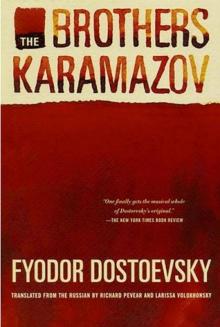 The Brothers Karamazov
The Brothers Karamazov Notes From Underground
Notes From Underground The Idiot
The Idiot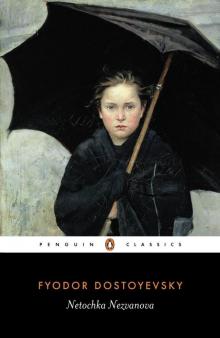 Netochka Nezvanova (Penguin ed.)
Netochka Nezvanova (Penguin ed.)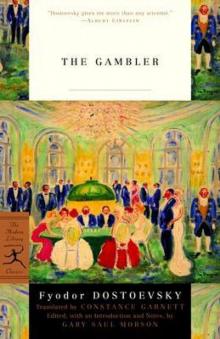 The Gambler
The Gambler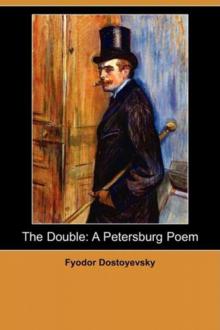 The Double
The Double Poor Folk Anthology
Poor Folk Anthology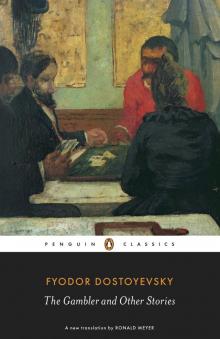 The Gambler and Other Stories (Penguin ed.)
The Gambler and Other Stories (Penguin ed.) Prestuplenie i nakazanie. English
Prestuplenie i nakazanie. English Notes from the Underground
Notes from the Underground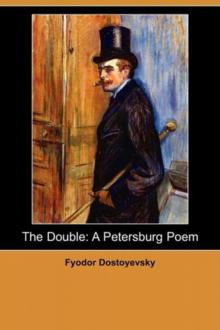 The Double: A Petersburg Poem
The Double: A Petersburg Poem White Nights and Other Stories / The Novels of Fyodor Dostoevsky, Volume X
White Nights and Other Stories / The Novels of Fyodor Dostoevsky, Volume X Complete Works of Fyodor Dostoyevsky
Complete Works of Fyodor Dostoyevsky Poor Folk and Other Stories
Poor Folk and Other Stories The House of the Dead
The House of the Dead